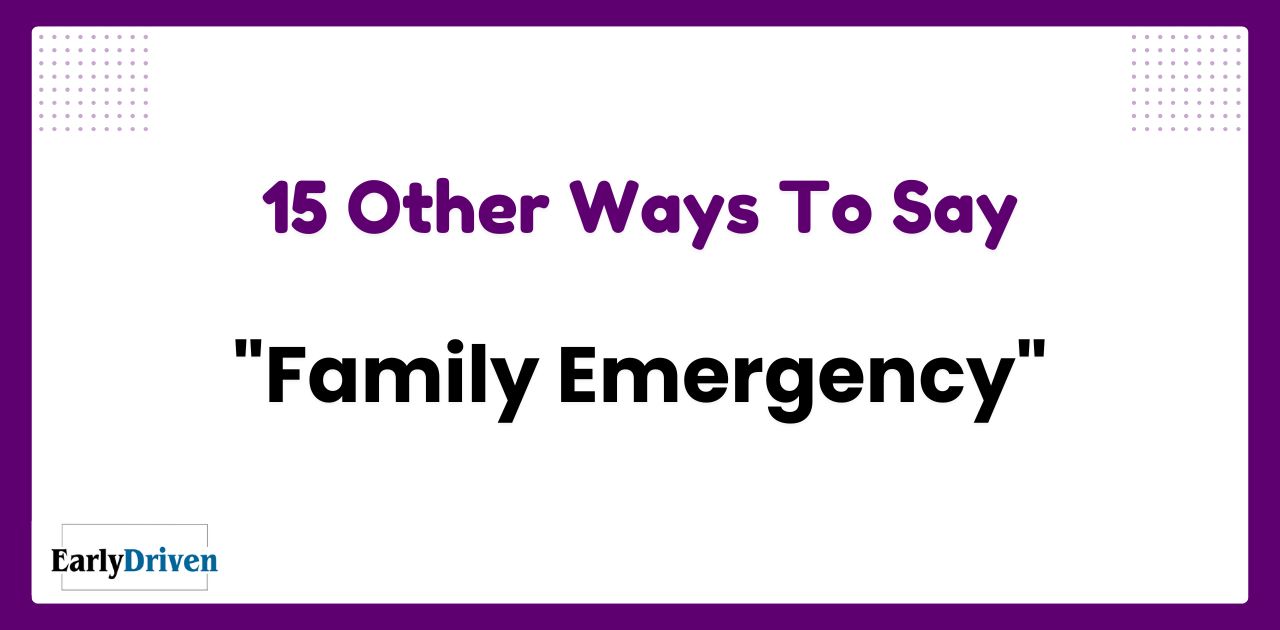In today’s professional environment, communicating about family emergencies requires both tact and clarity. While “family emergency” is a common phrase, having alternative expressions helps maintain privacy while effectively conveying urgency. This comprehensive guide explores professional alternatives and their appropriate usage in workplace communications.
Understanding the Purpose of Family Emergency Communications
Professional communication during personal crises requires balancing transparency with discretion. When urgent family matters arise, choosing the right terminology helps maintain workplace relationships while respecting personal boundaries. The key is conveying necessary information without oversharing or understating the situation’s importance.
Other Ways to Say “Family Emergency”
- Urgent Family Matter
- Family Stuff
- Family Business
- Household Matter
- Family Problems
- Family Medical Situation
- Pressing Family Concern
- Critical Family Issue
- Immediate Family Situation
- Unexpected Family Circumstance
- Unforeseen Family Situation
- Family Member in Distress
- Grieving A Loss
- Sudden Family Event
- Loved Ones
1. Urgent Family Matter
In professional communication, “urgent family matter” serves as a refined alternative that bridges formality with genuine urgency. This phrase has become particularly valuable in formal business settings where precision and professionalism are paramount.
Example: “I need to inform you of an urgent family matter requiring my immediate attention. I’ve prepared a detailed handover document for the Johnson project and will be reachable by phone for any critical questions. I anticipate returning to the office by Thursday and will provide updates if this timeline changes.”
2. Family Stuff
The phrase “family stuff” offers a more casual approach while maintaining professional appropriateness in less formal workplace environments. This expression works particularly well in start-up cultures or teams with established informal communication styles.
Example: “Just wanted to let you know I’m dealing with some family stuff that came up unexpectedly. I’ve already briefed Sarah on the status of our current projects, and she’ll be covering for me during the team meeting tomorrow. I’ll check email periodically and can jump on a call if anything urgent comes up.”
3. Family Business
“Family business” conveys both importance and privacy, striking an ideal balance in professional settings. This phrase has gained traction in corporate environments where personal boundaries are respected while maintaining clear communication channels.
Example: “I apologize for the short notice, but I need to attend to some family business tomorrow. I’ve already rescheduled my client meetings and updated the project timeline to accommodate this absence. I’ll be back in the office on Wednesday and will ensure all deadlines remain on track.”
4. Household Matter
In professional settings, “household matter” provides a tactful way to communicate domestic urgency while maintaining appropriate privacy boundaries. This phrase has gained prominence in modern workplace communication as organizations increasingly recognize the importance of work-life integration.
Example: “I wanted to inform you about a household matter that requires my immediate attention tomorrow morning. I’ve prepared detailed notes for the marketing presentation, which Jessica will deliver in my absence. I’ve also scheduled the vendor negotiations for next week to ensure I can give them my full attention. I’ll be available via phone after 2 PM if any urgent matters arise.”
5. Family Problems
The term “family problems” communicates ongoing situations that may require extended flexibility while maintaining professional decorum. This phrase has become more accepted as workplace cultures evolve to support employee well-being during challenging personal times.
Example: “I need to discuss some family problems that may impact my schedule over the next few weeks. I’ve developed a comprehensive work plan that ensures project continuity and would appreciate your input on the proposed arrangements. I remain committed to meeting all deadlines while managing these personal circumstances.”
Read Also: 15 Other Ways to Say “Hope All Is Well”
6. Pressing Family Concern
“Pressing family concern” effectively bridges the gap between urgency and professionalism, particularly useful in formal business environments. This phrase has emerged as a preferred option in corporate settings where clear communication about availability is essential.
Example: “I must address a pressing family concern that requires my attention for the remainder of the day. I’ve updated our project management system with current status reports, and Mike will lead this afternoon’s client call. I’ll ensure all pending deliverables are properly handled and will provide an update on my return timeline by end of day.”
7. Critical Family Issue
When communicating serious situations, “critical family issue” conveys appropriate gravity while maintaining professional boundaries. This phrase is particularly valuable in situations requiring immediate action and potential extended absence.
Example: “I need to inform you of a critical family issue that requires my immediate attention. I’ve prepared a detailed contingency plan for my ongoing projects, including contact information for team members handling various responsibilities. While I expect to be away for several days, I will provide regular updates on my status and availability.”
8. Immediate Family Situation
The phrase “immediate family situation” effectively communicates both urgency and the personal nature of the circumstance while maintaining professional standards. This expression has become increasingly common in workplace communications as organizations emphasize empathy and understanding.
Example: “An immediate family situation has arisen that requires me to take emergency leave starting tomorrow. I’ve completed the quarterly report draft and shared it with the review team. Sarah will handle the client presentations scheduled for this week, and I’ve briefed her thoroughly on all key points. I’ll maintain email contact for urgent matters and provide updates as the situation develops.”
10. Unexpected Family Circumstance
In professional environments, an “unexpected family circumstance” serves as a refined way to communicate sudden personal situations requiring immediate attention. This phrase has gained prominence in modern workplace communication as organizations increasingly recognize the need for work-life flexibility.
Example: “I need to inform you of an unexpected family circumstance that requires my immediate attention. I’ve taken the following steps to ensure business continuity:
- Completed the quarterly financial analysis and shared it with the team
- Briefed David on leading tomorrow’s strategic planning session
- Updated our project timeline to accommodate this brief absence
I anticipate returning to the office by Thursday and will remain accessible via phone for urgent matters requiring my input.”
11. Unforeseen Family Situation
The term “unforeseen family situation” provides a professional way to communicate unanticipated personal matters while maintaining appropriate boundaries. This expression has become particularly valuable in corporate settings where clear communication about availability is essential.
Example: “I must address an unforeseen family situation that requires my immediate attention for the next few days. I’ve prepared comprehensive handover notes for the Robinson account and briefed our team on pending deliverables. Our project management system has been updated with current status reports, and I’ve designated key contacts for various aspects of ongoing projects. I will provide daily updates on my return timeline and remain available for critical consultations via phone.”
12. Family Member in Distress
When communicating about urgent personal matters, “family member in distress” conveys the gravity of the situation while maintaining professional decorum. This phrase effectively communicates the need for immediate action while preserving personal privacy.
Example: “I’m writing to inform you about a family member in distress who requires my immediate support. I’ve taken the following preparatory steps:
- Completed and distributed the client proposal deadline today
- Prepared detailed briefing notes for next week’s board presentation
- Arranged coverage for my ongoing project responsibilities
- Set up an emergency contact protocol for urgent matters
I appreciate your understanding and will provide updates as circumstances allow.”
13. Grieving A Loss
In situations involving bereavement, “grieving a loss” communicates the sensitive nature of the absence while maintaining professional dignity. This phrase has become an accepted way to communicate about personal loss in workplace settings.
Example: “I need to inform you that our family is grieving a loss and I will require bereavement leave beginning tomorrow. I’ve ensured all immediate deliverables are complete and have arranged the following:
- Comprehensive handover notes for ongoing projects
- Team coverage assignments for the next two weeks
- Updated client communication protocols
- Emergency contact information for critical matters
I deeply appreciate your understanding during this difficult time and will provide appropriate updates regarding my return date.”
15. Loved Ones
Referencing “loved ones” provides a dignified way to communicate family-related absences while maintaining professional boundaries. This phrase has become increasingly accepted in modern workplace communication as organizations embrace more empathetic approaches to personal circumstances.
Example: “I need to be with my loved ones during an important family situation. To ensure business continuity, I have:
- Finalized all pending deliverables for this week
- Created comprehensive handover documentation
- Briefed the team on ongoing project requirements
- Established clear protocols for urgent matters
I will maintain appropriate communication channels and provide updates as circumstances allow.”
Best Practices for Professional Communications
- Be prompt in notification
- Maintain appropriate privacy boundaries
- Provide clear timeline expectations when possible
- Arrange for work coverage
- Follow up professionally once the situation allows
FAQ’s
Q: How much detail should I provide about a family emergency?
A: Provide only necessary information to explain your absence while maintaining personal privacy.
Q: Should I specify the duration of my absence?
A: When possible, provide an estimated timeline, but acknowledge it may need adjustment based on circumstances.
Q: How should I communicate updates during a family emergency?
A: Send brief, professional updates focusing on work-related impacts rather than personal details.
Q: How do you professionally call out for a family emergency?
A: Contact your supervisor promptly through appropriate channels, provide clear information about your expected absence duration, and ensure critical work responsibilities are covered. Remember to maintain professional boundaries while conveying the urgency of your situation.
Q: What’s a better way to say family emergency?
A: Several professional alternatives include “urgent family matter,” “immediate family situation,” or “pressing family concern.” Choose terminology that matches your workplace culture while maintaining appropriate privacy.
Q: How do you tell your boss you have a family emergency?
A: Communicate directly and promptly with your supervisor, focusing on work impact rather than personal details. Provide a clear timeline if possible, outline coverage plans for your responsibilities, and specify how you can be reached if needed for urgent matters.
Q: What qualifies as a family emergency?
A: Family emergencies typically include situations requiring immediate attention such as serious illness, accidents, hospitalizations, or urgent care needs of immediate family members. The specific definition may vary by workplace policy and should be verified with your HR department.
Q: How do you say out of office for a family emergency?
A: Create a professional out-of-office message stating your absence, expected return date, and alternative contacts for urgent matters. For example: “I am currently away attending to an urgent family matter. I will return to the office on [date]. For immediate assistance, please contact [name] at [contact information].”
Q: How do you document a family emergency?
A: Follow your organization’s leave request procedures, maintain written communication records, and provide any required documentation according to company policy. Keep copies of all correspondence and medical documentation if applicable while maintaining appropriate privacy boundaries.
Conclusion
Effectively communicating about family emergencies in professional settings requires balancing transparency with discretion. These alternatives to “family emergency” provide options for various situations and workplace cultures, ensuring clear communication while maintaining appropriate boundaries.
Choose the phrase that best fits your workplace culture and the specific circumstance, always prioritizing both professional responsibility and personal privacy.
Elevate you English Learning Skills with our Mastery Blogs!

“Smith, At EarlyDriven, our dedicated team of experienced writers and journalists brings you comprehensive coverage across entertainment, celebrity news, and educational content. With expertise in digital media and a commitment to accuracy, we craft engaging stories that inform, educate, and entertain our global readership.










